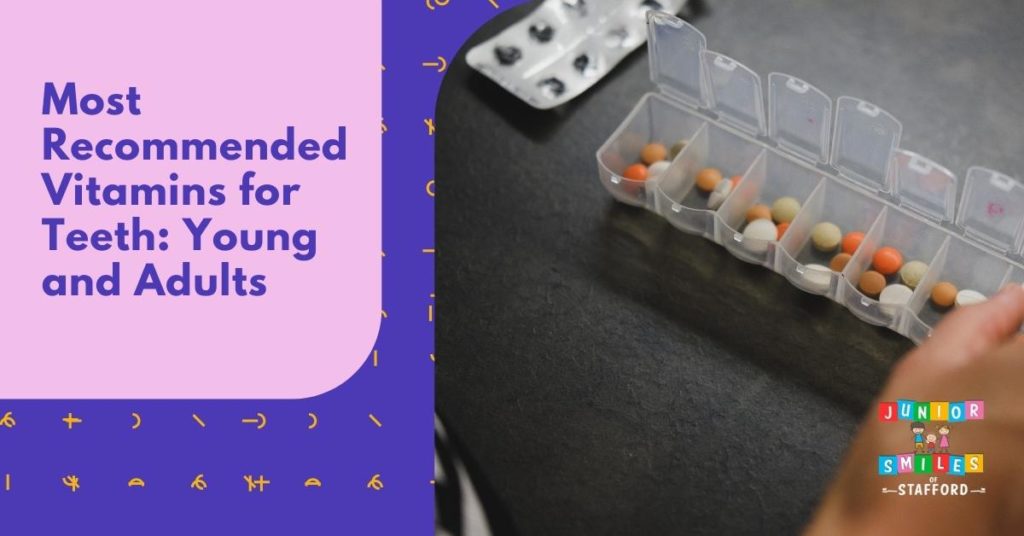Most Recommended Vitamins for Teeth: Young and Adults

Just in case you were unaware, deficiency in essential minerals and vitamins does not only affect the body; it also has adverse effect on your teeth and gums. Proper nutrition, on the other hand, requires excellent oral health. On the other hand, getting the right diet requires excellent dental health. In order to chew food effectively, a person needs strong teeth, gums, and underlying bone. This blog article will go over the value of vitamins for your child’s dental health, including which vitamins are beneficial and which foods contain them.
Why Vitamins are Essential for Healthy Teeth
Strengthening dental enamel is as simple as eating a diet rich in vital vitamins and minerals. Enamel acts as a protective covering for the tooth, preventing damage. It also shields the crown of the tooth from dental decay. Additionally, enamel acts as a barrier, protecting your teeth from acidic meals and drinks. An article in the International Journal of Environmental Research and Public Health states that chewing food thoroughly helps to release more nutrients from it. Meanwhile, inflammation and tooth loss may occur in the mouth as a consequence of not getting enough of certain nutrients. If you want to maintain healthy teeth and gums, you could do so by simply eating the correct foods and taking the appropriate vitamins.
The Top Vitamins for Strong and Healthy Teeth
If you want your kid to have healthy teeth and gums, you should make sure they consume foods and liquids that won’t erode, fracture, or develop cavities. The following are examples of vitamins and foods that have them that you may provide to your child:
Vitamin D – Fatty Fish
Called the “sunshine vitamin” for its ability to boost calcium absorption, vitamin D is crucial for healthy bones and teeth. Low vitamin D levels have been associated with an increased risk of dental caries and gum disease, which emphasizes the importance of calcium intake. Fatty fishes such as mackerel, sardines, tuna, and salmon are among the foods that include vitamin D. Nevertheless, you may also find it in cereals, dairy products, and especially egg yolks. The greatest part about vitamin D is that your child may get it in their natural environment, namely from sunlight.
Vitamin C – Citrus Fruits
Ascorbic acid, a form of vitamin C, fortifies the oral mucosa and gums. It may keep your teeth from becoming loose and protect you from gingivitis, the first stage of gum disease. Additionally, it has a reputation for curing oral wounds. Vitamin C also helps the body absorb iron, which is important for strong teeth and warding against infections in the mouth. Vitamin C may be found in citrus fruits including oranges, kiwis, and berries. It may also be found in peppers, potatoes, and broccoli.
Vitamin A – Orange Fruits or Veggies
In addition to bolstering the immune system, vitamin A is essential for good eyesight and encouraging enough saliva production. When your mucous membranes are healthy, you won’t have dry mouth and your mouth will recover faster. Also, your teeth and gums can absorb nutrients more effectively if your saliva production is consistent and healthy. Furthermore, among vitamin A’s many important functions is its promotion of white blood cell formation and its mediation of bone remodeling. Vitamin A is easily recalled when you associate it with brightly colored orange foods, such as sweet potatoes, melons, carrots, and pumpkins.
Vitamin K – Leafy Greens
Vitamin K is involved in maintaining healthy bones and teeth and is an essential component for blood clotting. To keep teeth healthy, robust and free of cavities, this vitamin plays an important role in regulating tooth mineralization. It’s also best for gum disease prevention. Furthermore, it is responsible for the production of osteocalcin, a protein that promotes healthy teeth by assisting with bone metabolism. Gerival hemorrhage and severe periodontitis may result from low vitamin K levels. Leafy greens, including kale, spinach, lettuce, and turnip, are a potential source of vitamin K. It may also be found in berries and soybeans.
B Vitamins – Meat, Liver, Fishes
Vitamins B2, B3, and B12 are important for maintaining healthy gums. A healthy mouth is one that produces enough saliva and has healthy mucous membranes, and these B vitamins help make that happen. Reducing inflammation in the mouth and protecting against canker sores are two of vitamin B12’s most essential functions. These vitamins may be found in chicken, fish, and meat. Dairy products, almonds, and dark green vegetables (such as spinach) are also strong sources of many B vitamins.
Keep Your Child’s Smile Bright with Junior Smiles of Stafford
Vitamins are essential for the overall health of your body, including your child’s teeth. These nutrients are essential for a child’s developing grin, from vitamin D for strong teeth to vitamin C for healthy gums. Keep in mind that maintaining a healthy mouth for life is possible with the correct combination of these vitamins and frequent dental exams.
If you want the best for your child’s teeth and gums, bring them to Junior Smiles of Stafford. The pediatric dentistry specialists on our team are trained to treat children with the utmost care while also attending to their specific requirements. Prevention and early dental education are cornerstones of our practice because they help children maintain healthier looking teeth throughout their lives.

